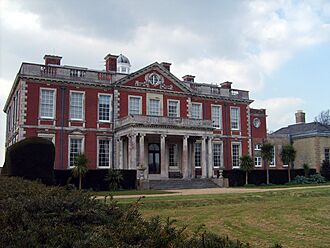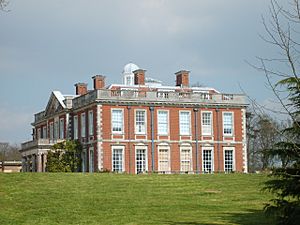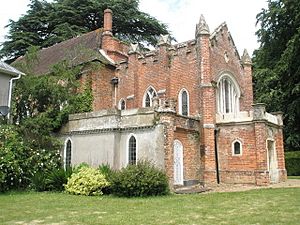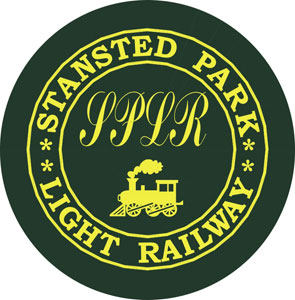Stansted Park facts for kids
Quick facts for kids Stansted Park |
|
|---|---|

Stansted House
|
|
| General information | |
| Location | Stoughton, West Sussex, England |
| Coordinates | 50°53′13″N 0°55′02″W / 50.887058°N 0.917282°W |
|
Listed Building – Grade II*
|
|
| Official name: Stansted House | |
| Designated: | 5 June 1958 |
| Reference #: | 1354611 |
| Official name: Stansted Park | |
| Designated: | 1 June 1984 |
| Reference #: | 1000327 |
Stansted Park is a large country estate in Stoughton, West Sussex, England. It includes a beautiful house called Stansted House. The estate is close to the city of Chichester and the village of Rowlands Castle.
The house is set within a huge park that covers about 1,800 acres (7.3 square kilometers). This park has woodlands and open areas where deer graze. Stansted House has a special design style from the Edwardian period. Both the house and the park are listed as Grade II* historic sites, meaning they are very important.
Contents
History of Stansted Park
Early Beginnings and Royal Visits
The land where Stansted Park stands was mentioned way back in 1086 in the Domesday Book. This was a big survey of England ordered by William the Conqueror. It seems that a hunting lodge was built here for Roger de Montgomery, an early Earl of Arundel.
Stansted was likely part of a royal forest used for hunting and timber. A survey from 1327 mentioned that the Manor of Stansted had a hall and a chapel.
Many English kings and queens have visited Stansted over the centuries.
- In 1177, Henry II of England came to Stansted.
- Richard I of England, also known as Richard the Lionheart, hunted boar here in 1194.
- John, King of England visited twice, in 1214 and 1215.
- Later, Edward VI came in 1552.
- Elizabeth I visited a house on the site in 1591.
Building and Rebuilding the House
A new house was started in 1686 for Richard Lumley, the first Earl of Scarbrough. He also designed formal gardens and avenues around the house.
In 1776, George Montagu-Dunk inherited the property. He built a nearby tower, now known as Racton Monument. After his death, his daughter Anna Donaldson took over. In 1778, George III and Queen Charlotte visited. The property was later sold, and new owners made changes to the house and grounds.
Sadly, the main part of the house was destroyed by a fire in 1900. However, the stables and service areas were saved. The house was rebuilt in 1903, looking similar to its original design. An architect named Arthur Blomfield led this work.
Later Owners and Public Access
In 1924, Vere Ponsonby, the 9th Earl of Bessborough, bought Stansted Park. During World War II, the house provided shelter for children who had lost their homes.
More recently, Queen Elizabeth The Queen Mother stayed here in 1939. In 1962, Anne, Princess Royal also visited Stansted House.
Since 1983, Stansted Park and its estate have been looked after by the Stansted Park Foundation. This is a special charity that works to keep the estate preserved for everyone to enjoy. The foundation was set up by Frederick Ponsonby, the 10th Earl of Bessborough. He wanted to make sure the estate would be cared for even after he was gone.
The park is also crossed by a long walking path called the Monarch's Way.
Chapel of St Paul
The Chapel of St Paul is a beautiful church located within Stansted Park. It was built between 1812 and 1816 by Lewis Way. He built it as part of his religious mission.
The chapel is a very important historic building, listed as Grade I. It even inspired the famous poet John Keats when he was writing his poem The Eve of St. Agnes. The church was restored in 1926 by Harry Stuart Goodhart-Rendel.
The chapel has a unique East window with Christian and Jewish symbols. It also has Hebrew tablets showing the Ten Commandments. During the 1926 restoration, the inside of the chapel was re-decorated. Its design was inspired by the famous Sainte-Chapelle in Paris. The chapel was damaged during World War II but was repaired in 1947.
Restoration work on the chapel was completed a few years ago. This work was supported by a grant from the Heritage Lottery Fund.
Stansted Park Light Railway
The Stansted Park Light Railway is a fun miniature railway located on the grounds of Stansted House. It has a track gauge of 7.25 inches. The railway first opened in 2005. It was built to attract more visitors to the estate.
The railway uses small locomotives and carriages. These were designed and built by volunteers who love trains. The railway has been growing, and a new extension was completed a few years ago. This extension includes a 12-foot long bridge. A new shed for the locomotives has also been finished.
Early Cricket Matches
Stansted Park has a connection to the sport of cricket. In June 1741, a cricket match was played in the park. It was between the Slindon Cricket Club and the Portsmouth Cricket Club. This is one of the earliest known reports of a match involving the Slindon team.
The Duke of Richmond, who supported the Slindon team, wrote a letter about the match. He said that "above 5,000 people" came to watch. This is the only time Stansted Park is mentioned in old cricket records. A cricket club still plays games in the park during the summer.
See also
- Grade II* listed buildings in West Sussex
 | Ernest Everett Just |
 | Mary Jackson |
 | Emmett Chappelle |
 | Marie Maynard Daly |




